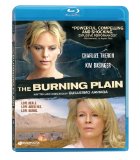| Reviews & Columns |
|
Reviews DVD TV on DVD Blu-ray 4K UHD International DVDs In Theaters Reviews by Studio Video Games Features Collector Series DVDs Easter Egg Database Interviews DVD Talk Radio Feature Articles Columns Anime Talk DVD Savant Horror DVDs The M.O.D. Squad Art House HD Talk Silent DVD
|
DVD Talk Forum |
|
|
| Resources |
|
DVD Price Search Customer Service #'s RCE Info Links |
|
Columns
|
|
|
Burning Plain, The
Magnolia Home Entertainment // R // January 12, 2010
List Price: $29.98 [Buy now and save at Amazon]
The Film:
Alejandro González Iñárritu may have concluded his string of morality films with Babel, but writer Guillermo Arriaga obviously wasn't ready for that to happen. Thus enters The Burning Plain, another emotion-heavy, endlessly melancholy picture that also finds the 21 Grams and Amores Perros writer in the director's chair for his feature-length premiere. It's a story about heartbreak, lost innocence, neglecting children and adulterous behavior -- you know, feel good material -- that's told through several broken narratives that interconnect at the end to form some sort of play on ethics and integrity. All the opulent photography and sturdy performances can't save the audience from the been-there, done-that condition created with Arriaga's picture, a unremarkable yet watchable weeper that's more compelling than it deserves to be due to Charlize Theron and up-and-comer Jennifer Lawrence.
Theron plays Sylvia, a professionally-poised restaurant manager who recklessly strives for satisfaction -- or, more, to distract her from pain -- through flighty sexual encounters. The second memorable image we see in The Burning Plain is of her standing nude in the window of a cold, emotionless apartment, gazing icily down at a street where children and parents pass. I say it's the second because the first memorable image is that of a trailer engulfed in flames, solemnly placed in the middle of a barren field. It's clear that Sylvia and this image interconnect, harking to a past that comes barreling back into Sylvia's life by a suspicious, stalking stranger. But, much like Arriaga's other screenplays, we're asked to juggle a few time-lapsed narratives: one involving two families butting heads after the death of one's father, Nick (Joaquim de Almeida), and the other's mother, Gina (Kim Basinger), together at the time of their death due to their adulterous affair, and the other telling the story of their affair before the accident.
Much like his other writing efforts, Guillermo Arriaga's film isn't short on plot complication -- just in case you couldn't gather that from the synopsis. The Burning Plain's nearly two-hour runtime attempts to craft identifiably glum characters by thriving on dramatic contortion, while attempting to shape our comprehension of Sylvia's angst-riddled sexual activities and empathize with mother Gina's need for an affair. With this particular "heavy" writing style, leaving elements vague long into the film, it works. The problem is that we've already experienced something quite similar in Arriaga's 21 Grams, which, in every single facet, is a much tighter piece of work. He again asks us to identify with seemingly taboo behavior, pushing the boundaries of normal relationship comprehension for special circumstances, as intimate affairs are ways in which to mask the pain of death and illness. Familiar, deeply emotional tones ask us to grasp the reasoning behind Sylvia's broken relationship with her line cook, played by an underutilized John Corbett, and bridge some form of compassionate sensation to a cheating couple turning their backs on their families, handled with only passable poise by Basinger and de Almeida.
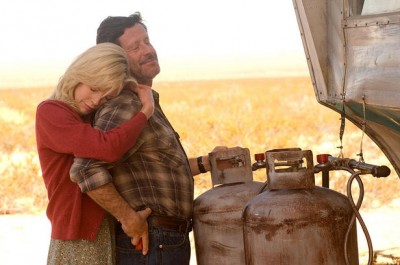 The Burning Plain's biggest asset is the oddly compelling relationship that develops between two of the teenage children in the "past" story arc, a romantic link blossoming between Mariana (Jennifer Lawrence), Gina's daughter, and Santiago (J.D. Pardo), Nick's son. It might be something straight out of Romeo and Juliet, since it develops amid bickering between families -- about placing blame for the extramarital affair that lead to the accident -- but the ways in which the two kids react and allow themselves to grow is illuminating. Scenes where they make scars on their bodies to create memories and wear their parents' clothes are notably touching, and in ways sleekly foreshadowing. Because of their whirlwind romance, fueled by both furious and sorrowful memories of their parents, we witness how other characters in the film develop. They overcome their family's spat and begin identifying with each other as individuals who have both lost a key figure in their life, similar in a roundabout way to the couple in Wong Kar-wai's In the Mood for Love or to the Thornton / Berry pairing in Marc Forster's Monster's Ball.
The Burning Plain's biggest asset is the oddly compelling relationship that develops between two of the teenage children in the "past" story arc, a romantic link blossoming between Mariana (Jennifer Lawrence), Gina's daughter, and Santiago (J.D. Pardo), Nick's son. It might be something straight out of Romeo and Juliet, since it develops amid bickering between families -- about placing blame for the extramarital affair that lead to the accident -- but the ways in which the two kids react and allow themselves to grow is illuminating. Scenes where they make scars on their bodies to create memories and wear their parents' clothes are notably touching, and in ways sleekly foreshadowing. Because of their whirlwind romance, fueled by both furious and sorrowful memories of their parents, we witness how other characters in the film develop. They overcome their family's spat and begin identifying with each other as individuals who have both lost a key figure in their life, similar in a roundabout way to the couple in Wong Kar-wai's In the Mood for Love or to the Thornton / Berry pairing in Marc Forster's Monster's Ball.
That's also the biggest problem with The Burning Plain, though, and why the emotional punch fizzles upon its conclusions: we're persistently waiting, and for foreseeable, formulaic answers. Those familiar with Arriaga's writing style are no strangers to biding time before everything comes to a clandestine resolution, yet the scattershot way in which the back-and-forth timeline is handled here simply generates impatience. Charlize Theron does an excellent job as the morose Sylvia, while Jennifer Lawrence really impresses as a young doppelganger; their performances, however, are not strong enough to hold our interest in their oblique, at times meaningless-feeling story deviations -- even though we can tell they won't be meaningless. All of the acting in each time thread is rather good and rarely allows us to stray from our suspended belief, but it's hard not to want these flashbacks and real-time events to simply get moving and dampen the attempts at emotional pokes and prods.
Arriaga takes roughly half the movie to allow the plots to intersect, though the figurative color timing from the joint John Toll / Robert Elswit photography suggests a connection all along, and we're left only appreciating each one as unconnected capsules for a lengthy period. Then, when the connections finally do become clear and address our intuitions, it feels like old, stale news. Clearly, all this could be at least part intentional, that Arriaga wants us to get the gears moving long before The Burning Plain makes lucid sense. That's actually a welcome engagement with the audience, as he probes us to piece together the narrative based on our perceptions of dramatic poise and our own hunches. It's simply too proverbial and sluggish to justify the time it takes to deliver its haughty, meagerly affective blow, something that feels like a second punch in the arm on an already numbed spot where you've been punched before.
The Blu-ray:
Video and Audio:
Magnolia's 2.39:1 1080p presentation of The Burning Plain looks largely spectacular, rich with a film-like disposition that carries over a splendid level of detail and satisfying depth levels. Several exterior shots involve crashing waves against a cold water-side beach, with dark rocks and deep water coloring captured in the shots, and they are easily the most eye-grabbing moments in this VC-1 encode. Icy flesh tones during the "real time" sequences convey just the right amount of color needed for the director's intent, while the sun-baked moments in the desert that swallow up 3/4 of the picture in the "past" sequences offer finely-represented flesh tones and accurate colors -- though they push towards tan and teal/blue. One constant throughout the image is the fine contrast levels, which present deep blacks yet quite a few impressive shadowy sections. It might not be the most satisfying of dramas, but Arriaga's picture comes through with a meaty, pleasing visual experience.
Along those same lines, this DTS HD Master Audio track also surprises with its breadth in surround effects. For a drama, the level of activity can be impressive; airplane effects trail from back to front on several occasions, while insect noises in the desert and crashing waves craft fine ambiance. Of course, dialogue crispness is paramount for this experience, which isn't ignored by this track, staying pleasingly buoyant and finely-pitched. For its aims, this audio track won't disappoint. Subtitles are available in two optional tracks, English SDH and Spanish,
Special Features:
The Making of The Burning Plain (43:27, HD 16x9/4:3):
Here, we've got a very lengthy, indulgent assembly documentary-style piece that hammers through all of the expected bullet points for the picture -- the origin of Arriaga's screenplay, symbolism behind fire, casting, cinematography, and the like. The Burning Plain is both a fire and wind story, commentates Arriaga through interviews, which sums up a good chunk of the thematic discussion. Lots of behind-the-scenes sequences crop up into the piece, which open up a few fine insights into some of the ways they captured shots, but this is mostly an overlong, dull piece that just straps dialogue onto the raw off-screen footage for posterity's sake.
Also available are a Music of The Burning Plain (15:31) piece that annotates the drives behind the film's distinct score, and a quick HDnet: A Look at The Burning Plain (4:43) spot.
Final Thoughts:
I've been sold on Guillermo Arriaga's writing style for quite a while, especially with 21 Grams, but his directorial premiere with The Burning Plain leaves a bit to be desired. Decent performances highlight the dramatically boisterous picture, yet the interwoven timeline structure -- a tactic used in Arriaga's other screenplays -- infuriates before it satisfies. Still, Magnolia's Blu-ray is worth a Rental for the modicum of dramatic intrigue it offers, as well as for some of the messages underneath its overblown posture.
Thomas Spurlin, Staff Reviewer -- DVDTalk Reviews | Personal Blog/Site
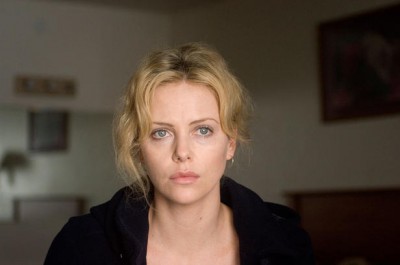 |
Theron plays Sylvia, a professionally-poised restaurant manager who recklessly strives for satisfaction -- or, more, to distract her from pain -- through flighty sexual encounters. The second memorable image we see in The Burning Plain is of her standing nude in the window of a cold, emotionless apartment, gazing icily down at a street where children and parents pass. I say it's the second because the first memorable image is that of a trailer engulfed in flames, solemnly placed in the middle of a barren field. It's clear that Sylvia and this image interconnect, harking to a past that comes barreling back into Sylvia's life by a suspicious, stalking stranger. But, much like Arriaga's other screenplays, we're asked to juggle a few time-lapsed narratives: one involving two families butting heads after the death of one's father, Nick (Joaquim de Almeida), and the other's mother, Gina (Kim Basinger), together at the time of their death due to their adulterous affair, and the other telling the story of their affair before the accident.
Much like his other writing efforts, Guillermo Arriaga's film isn't short on plot complication -- just in case you couldn't gather that from the synopsis. The Burning Plain's nearly two-hour runtime attempts to craft identifiably glum characters by thriving on dramatic contortion, while attempting to shape our comprehension of Sylvia's angst-riddled sexual activities and empathize with mother Gina's need for an affair. With this particular "heavy" writing style, leaving elements vague long into the film, it works. The problem is that we've already experienced something quite similar in Arriaga's 21 Grams, which, in every single facet, is a much tighter piece of work. He again asks us to identify with seemingly taboo behavior, pushing the boundaries of normal relationship comprehension for special circumstances, as intimate affairs are ways in which to mask the pain of death and illness. Familiar, deeply emotional tones ask us to grasp the reasoning behind Sylvia's broken relationship with her line cook, played by an underutilized John Corbett, and bridge some form of compassionate sensation to a cheating couple turning their backs on their families, handled with only passable poise by Basinger and de Almeida.
 The Burning Plain's biggest asset is the oddly compelling relationship that develops between two of the teenage children in the "past" story arc, a romantic link blossoming between Mariana (Jennifer Lawrence), Gina's daughter, and Santiago (J.D. Pardo), Nick's son. It might be something straight out of Romeo and Juliet, since it develops amid bickering between families -- about placing blame for the extramarital affair that lead to the accident -- but the ways in which the two kids react and allow themselves to grow is illuminating. Scenes where they make scars on their bodies to create memories and wear their parents' clothes are notably touching, and in ways sleekly foreshadowing. Because of their whirlwind romance, fueled by both furious and sorrowful memories of their parents, we witness how other characters in the film develop. They overcome their family's spat and begin identifying with each other as individuals who have both lost a key figure in their life, similar in a roundabout way to the couple in Wong Kar-wai's In the Mood for Love or to the Thornton / Berry pairing in Marc Forster's Monster's Ball.
The Burning Plain's biggest asset is the oddly compelling relationship that develops between two of the teenage children in the "past" story arc, a romantic link blossoming between Mariana (Jennifer Lawrence), Gina's daughter, and Santiago (J.D. Pardo), Nick's son. It might be something straight out of Romeo and Juliet, since it develops amid bickering between families -- about placing blame for the extramarital affair that lead to the accident -- but the ways in which the two kids react and allow themselves to grow is illuminating. Scenes where they make scars on their bodies to create memories and wear their parents' clothes are notably touching, and in ways sleekly foreshadowing. Because of their whirlwind romance, fueled by both furious and sorrowful memories of their parents, we witness how other characters in the film develop. They overcome their family's spat and begin identifying with each other as individuals who have both lost a key figure in their life, similar in a roundabout way to the couple in Wong Kar-wai's In the Mood for Love or to the Thornton / Berry pairing in Marc Forster's Monster's Ball. That's also the biggest problem with The Burning Plain, though, and why the emotional punch fizzles upon its conclusions: we're persistently waiting, and for foreseeable, formulaic answers. Those familiar with Arriaga's writing style are no strangers to biding time before everything comes to a clandestine resolution, yet the scattershot way in which the back-and-forth timeline is handled here simply generates impatience. Charlize Theron does an excellent job as the morose Sylvia, while Jennifer Lawrence really impresses as a young doppelganger; their performances, however, are not strong enough to hold our interest in their oblique, at times meaningless-feeling story deviations -- even though we can tell they won't be meaningless. All of the acting in each time thread is rather good and rarely allows us to stray from our suspended belief, but it's hard not to want these flashbacks and real-time events to simply get moving and dampen the attempts at emotional pokes and prods.
Arriaga takes roughly half the movie to allow the plots to intersect, though the figurative color timing from the joint John Toll / Robert Elswit photography suggests a connection all along, and we're left only appreciating each one as unconnected capsules for a lengthy period. Then, when the connections finally do become clear and address our intuitions, it feels like old, stale news. Clearly, all this could be at least part intentional, that Arriaga wants us to get the gears moving long before The Burning Plain makes lucid sense. That's actually a welcome engagement with the audience, as he probes us to piece together the narrative based on our perceptions of dramatic poise and our own hunches. It's simply too proverbial and sluggish to justify the time it takes to deliver its haughty, meagerly affective blow, something that feels like a second punch in the arm on an already numbed spot where you've been punched before.
The Blu-ray:
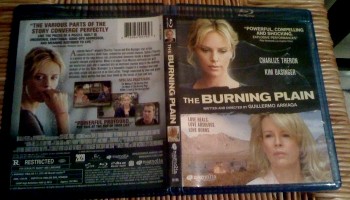 | 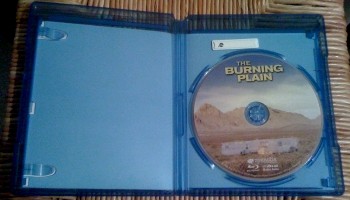 |
Video and Audio:
Magnolia's 2.39:1 1080p presentation of The Burning Plain looks largely spectacular, rich with a film-like disposition that carries over a splendid level of detail and satisfying depth levels. Several exterior shots involve crashing waves against a cold water-side beach, with dark rocks and deep water coloring captured in the shots, and they are easily the most eye-grabbing moments in this VC-1 encode. Icy flesh tones during the "real time" sequences convey just the right amount of color needed for the director's intent, while the sun-baked moments in the desert that swallow up 3/4 of the picture in the "past" sequences offer finely-represented flesh tones and accurate colors -- though they push towards tan and teal/blue. One constant throughout the image is the fine contrast levels, which present deep blacks yet quite a few impressive shadowy sections. It might not be the most satisfying of dramas, but Arriaga's picture comes through with a meaty, pleasing visual experience.
Along those same lines, this DTS HD Master Audio track also surprises with its breadth in surround effects. For a drama, the level of activity can be impressive; airplane effects trail from back to front on several occasions, while insect noises in the desert and crashing waves craft fine ambiance. Of course, dialogue crispness is paramount for this experience, which isn't ignored by this track, staying pleasingly buoyant and finely-pitched. For its aims, this audio track won't disappoint. Subtitles are available in two optional tracks, English SDH and Spanish,
Special Features:
The Making of The Burning Plain (43:27, HD 16x9/4:3):
Here, we've got a very lengthy, indulgent assembly documentary-style piece that hammers through all of the expected bullet points for the picture -- the origin of Arriaga's screenplay, symbolism behind fire, casting, cinematography, and the like. The Burning Plain is both a fire and wind story, commentates Arriaga through interviews, which sums up a good chunk of the thematic discussion. Lots of behind-the-scenes sequences crop up into the piece, which open up a few fine insights into some of the ways they captured shots, but this is mostly an overlong, dull piece that just straps dialogue onto the raw off-screen footage for posterity's sake.
Also available are a Music of The Burning Plain (15:31) piece that annotates the drives behind the film's distinct score, and a quick HDnet: A Look at The Burning Plain (4:43) spot.
Final Thoughts:
I've been sold on Guillermo Arriaga's writing style for quite a while, especially with 21 Grams, but his directorial premiere with The Burning Plain leaves a bit to be desired. Decent performances highlight the dramatically boisterous picture, yet the interwoven timeline structure -- a tactic used in Arriaga's other screenplays -- infuriates before it satisfies. Still, Magnolia's Blu-ray is worth a Rental for the modicum of dramatic intrigue it offers, as well as for some of the messages underneath its overblown posture.
|
| Popular Reviews |
| Sponsored Links |
|
|
| Sponsored Links |
|
|
| Release List | Reviews | Shop | Newsletter | Forum | DVD Giveaways | Blu-Ray | Advertise |
|
Copyright 2024 DVDTalk.com All Rights Reserved. Legal Info, Privacy Policy, Terms of Use,
Manage Preferences,
Your Privacy Choices | |||||||









